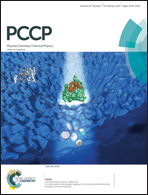Hydrogen- and oxygen-related effects in phthalocyanine crystals: formation of carrier traps and a change in the magnetic state
Abstract
The performance of organic semiconductors as electronic materials is very sensitive to impurity incorporation and reactions. Here we show using first-principles calculations that hydrogen and oxygen impurities introduce distinct changes in the electronic properties of metal phthalocyanines (MPc), a family of organic semiconductors renowned for their light conversion efficiency. Selective adsorption of hydrogen atoms on pyridinic nitrogen atoms of MPc molecules, namely zinc and copper phthalocyanines, modifies the magnetic state of the latter and generates carrier trap states deep in the band gap of MPc crystals. Reactions with O atoms have a lesser effect on MPc electronic properties, while intercalated oxygen molecules give rise to traps below the conduction band minimum. The results identify H and O impurities as important degradation culprits for MPc-based systems, in agreement with pertinent experiments.


 Please wait while we load your content...
Please wait while we load your content...